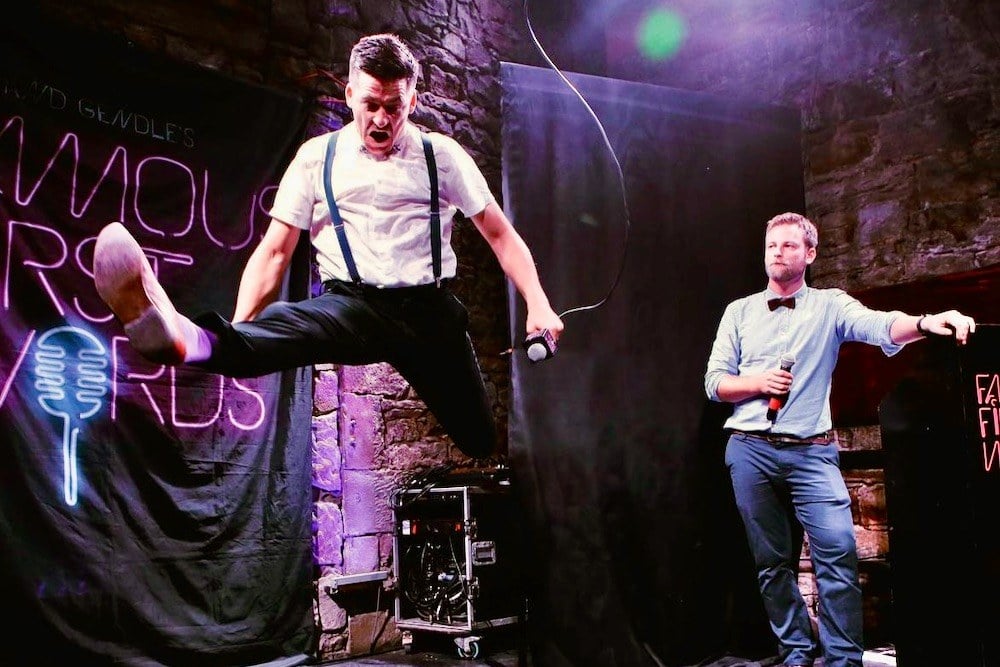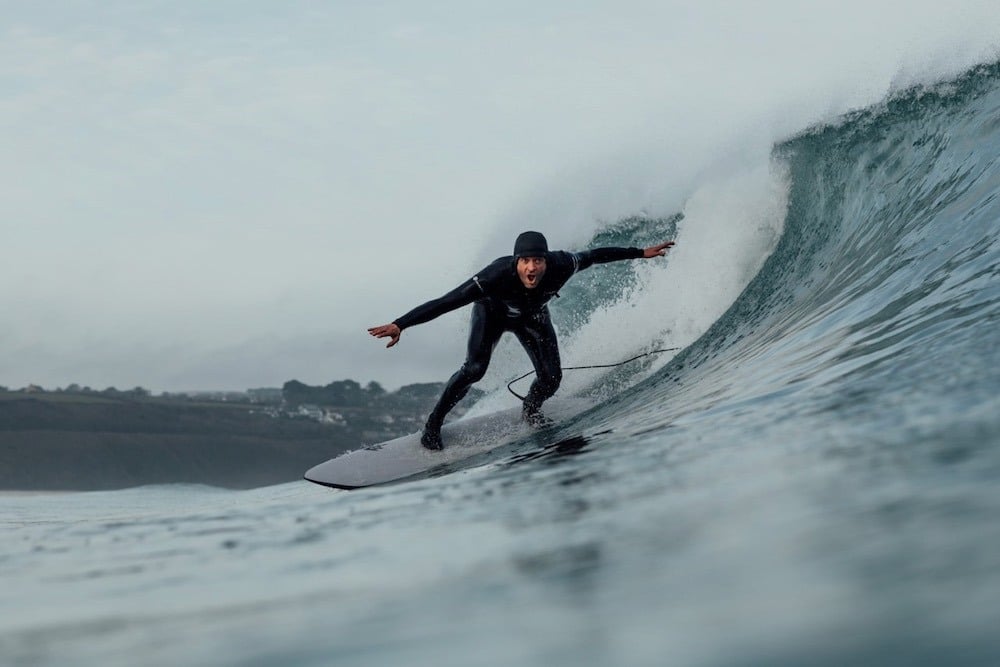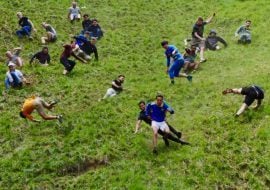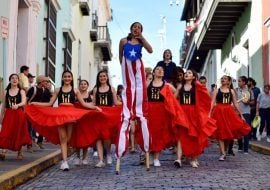Wife Carrying: Julia Galvin
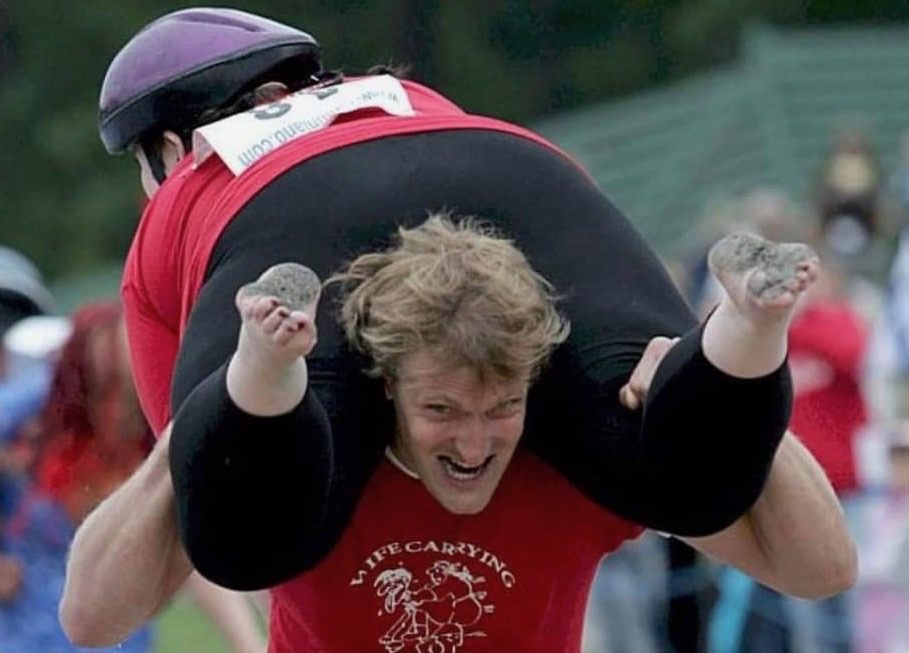

Episode 9: Podcast with Julia Galvin, the Queen of Weird Sports
In this episode, Oli Russell-Cowan chats to Julia Galvin, a novelty sports enthusiast. After a car accident, Zimmer frame for 3 years and reading the Guinness World Records Book in hospital Julia learned to swim and bog snorkel. She became the Ladies World Champion Mountain Bike Bog snorkeller and soon went on to the Wife Carrying World Championships in Sonkajärvi, Finland! Listen to her stories about bouncing back and what it takes to win.
In their conversation, Julia dives deep on how her injuries in her twenties made her driven to learn how to swim and snorkel to compete in bog snorkelling. Having competed in many weird sports competitions for over 20 years now Julia enjoys meeting other competitors and world champions from all over the world, the strangeness of the sports and the community around them that creates a sense of belonging.
The main takeaway of the chat was that life is too short. Make the most of it.
‘With alternative games, there’s a sport for all. I went from cripple to champion in the space of a couple of years.’
Listen to the podcast:
Dive in and listen to this episode on Apple Podcast and Spotify.

Read the transcript:
Rad Season: Hi guys, it’s Oli from Rad Season. I’m excited to be joined today by novelty sports enthusiast Julia Galvin. Julia has competed 20 times in the Bog Snorkelling Championships, as well as competing in the World Wife Carrying Championships, and the Bog Snorkelling Mountain Biking Championships as well.
Oli: Whereabouts are you at the moment?
Julia Galvin: I’m in the local literary center here in Listowel. I thought I’d get away from the cats and dogs.
Oli: Good stuff. Where did you grow up? It would be great to get an understanding of how you got into these sports?
Julia: I was born in England of Irish parents. I was there until I was six and a half, seven. Then we moved back to Ireland after my granny passed away and we’ve been there ever since. I have a strange twang in the accent so that’s where it comes from.
Oli: I was at the World Bog Snorkelling Championships in Wales last year, you were there as well, right?
Julia: Yeah. I may have spoken to you. I had to get away quickly because I was going to China. Now there’s a bit of an “action” drop. I was first in for my 20th year of bog snorkelling and had to get away from North Wales to catch a boat to get a plane to go to China.
Oli: What were you doing over in China?
Julia: Wife Carrying Competition. It was their first wife carrying competition in China. So I went over there with a gang of international crazy sports stars and had a great time. It was before all the trouble.
Oli: That’s amazing. Where did this all begin?
Julia: Lots of key elements leading to all this. When I was 25, I was in a slight accident. And again when I was about 27 a small accident. It left me with a kind of whiplash in my back and sciatica going down both my legs, which gave me scoliosis. I was in terrible pain and on 16 tablets a day when I was 27. I had a zimmer frame, I couldn’t walk, I was in hospital. I didn’t think there was too much for me in this life. After about two years of lying down, I decided that I had to start taking action.
So I got some swimming lessons. Because they told me that I needed an operation. So I said, I need to learn to swim in order to be able to rehabilitate after this operation. I got into the hospital and this was after being 27 days in another hospital, they brought me to the orthopedic hospital. The nurse looked at my medication. And she said, Sorry, dear, there’s no operation for you because you’re on too much medication.
Guinness Book of Records and Bog Snorkelling
At that point, I was looking at the Guinness Book of Records waiting for my father to pick me up from the hospital. And on one page, I know it was a left-hand side page, there was this guy going out of the bog at the World Championships of Bog Snorkelling. Now I live in a bog.
And there is no way that we were ever allowed to go out to the bog on our own. We certainly wouldn’t have swum in it. I probably would know my way to walk across it. Whereas, people who weren’t native to bogs wouldn’t have a clue how to walk across it without sinking.
We were always warned against bogs and bog holes to keep away from them. When I saw this, I said to myself, Oh my goodness, look at him swimming in a bog hole and look at me. I’m learning to swim. And I said,

The thing of it is, at this point, I was still on a lot of medication. It could have been the medication that was influencing my mind at that point. I came out and the following week on the television, I saw the Bog Snorkelling Championships on the television.
Now, I’ve never heard of them in all my years. I’ve never heard of them. All of a sudden, twice in a week, I’d heard about bog snorkelling and I turned to my father and said, ‘I’m going to do that’.
That was the first time I had actually spoken out loud to anybody. I think he humored me because at that point, I still had a zimmer frame and twisted and turned and he just said, ‘yes dear’. From that day onwards, I decided, it was 1998. Nobody had the internet then so I had to ring a friend of mine who worked in a big company in London to see if he could find out anything about this thing called bog snorkelling on this thing called the internet.
He got back to me after a couple of days, and he told me all about it. He got me a phone number. So then I rang Gordon Green, the guy that runs the bog snorkelling and invented bog snorkelling in Wales, all about and he said, Oh, that won’t be on for another 11 months. He said you’re a bit early. I suppose you could send your application form, that would be marvelous. So it gave me the motivation to carry on with my swimming.
I hadn’t swum before. I was 27 and had never swum. And within six lessons, I learned how to swim the length of a pool. Now, my first lesson consisted of me more or less crawling along a wall and holding onto a wall. Because I couldn’t hold myself up straight and within six lessons even though I was going in on crutches, and I could swim the length of a pool, so I took to it like a duck to water you could say, Oli.
Bog Snorkelling for the first time
Oli: That’s amazing. So after you did it for the first time, what was that experience like?
Julia: I suppose, before I threw myself in literally, I did some bog snorkelling in my own bog at home just to see what it was like. The fear factor like this one is black, dark, and you can’t see anything. It’s like swimming through tea. Then once you stir up the sediment, it’s like swimming through some kind of oxtail soup, you just find it difficult to get through there.
It’s cold. You hear sounds that you wouldn’t be used to in the air. The cold rushes into your wetsuit. At that time I got my friend to tie a rope around me whilst I snorkelled even though I’d only just learned to snorkel a couple of weeks beforehand. I decided, well, I still haven’t trusted this bog, even though I’ve lived there all my life. I wouldn’t trust it. So I got a rope, I was snorkelling with a rope around me like an animal on a leash. Yeah. That was an exciting day.
Then I went to Wales. It kind of kicked off around here a little bit. I was dependent on my father for everything. All of a sudden radio stations wanted to talk to me and newspapers and all sorts of things. So I was kind of like really thrown in, we say literally into the deep end of all of this. I ended up being sponsored by Ben and Jerry’s ice cream to go to Wales where they were the main sponsors. There were radio stations over here following my every move. I’d been on an airplane for years. I led a very quiet life then all of a sudden, I was thrown in.
I was really lucky that I could walk. It was in August, so 12 months have passed.
‘I’d learned to swim, I’d learn to walk and I’d learn to snorkel.’
Julia: My time wasn’t now what it was then in 1999. And I haven’t looked back since.
Oli: You have done 20 competitions. Were they all kind of close together? Like every year, you would go back?
Julia: Every year. From not being able to walk in 98 I came second in the Lady’s World Championships in 99, my first go out. I suppose we say any age has moved on a long time every year since. There are Commonwealth swimmers and all sorts of people and all sorts of lifeguards coming in. I’m just pleased that I can actually do it now.
My big thing was about 2004, five years later, I went on and I took part in the Ladies Mountain Bike Bog Snorkelling Championships, which is a different race. I came first! I’m the Ladies World Champion in Mountain Bike Bog Snorkelling.
Oli: Is that run by the same organizers Green Events as well?
Julia: Yeah. That normally goes on in June.
Oli: they’ve got some amazing, pretty wacky events.
Julia: They have the Man versus Horse race which they’re famous for. That’s all to do with long-distance running. 22 miles, I think. They were trying to decide which could go faster over rough terrain. Was it a horse or a man? People have won it a couple of times, I think a Kenyan has won it. It’s quite a big race for long-distance runners. But it’s mostly horses that win. I think there’s a lot of money for the people that do actually win. And then there’s the World Alternative Games as well.
Taking place in Llanwrtyd Wells, it is the smallest town in Britain. It’s famous for all these races. The town has about 600 people and it doubles in size at some of these races. I’ve really taken that village to my heart and likewise back vice versa. I love it over there.
Oli: So going on from bog snorkelling, were you looking for more unusual sporting events?
Julia: It’s a funny thing once you get a taste for it. I would say being the big woman that I am, I’m not able to go up Everest, long-distance running or anything like that or not at the moment anyway. So I take part in sports that I can take part in. I think you had my weird sports friend Sol Neelman speaking about how he found the Olympics boring.
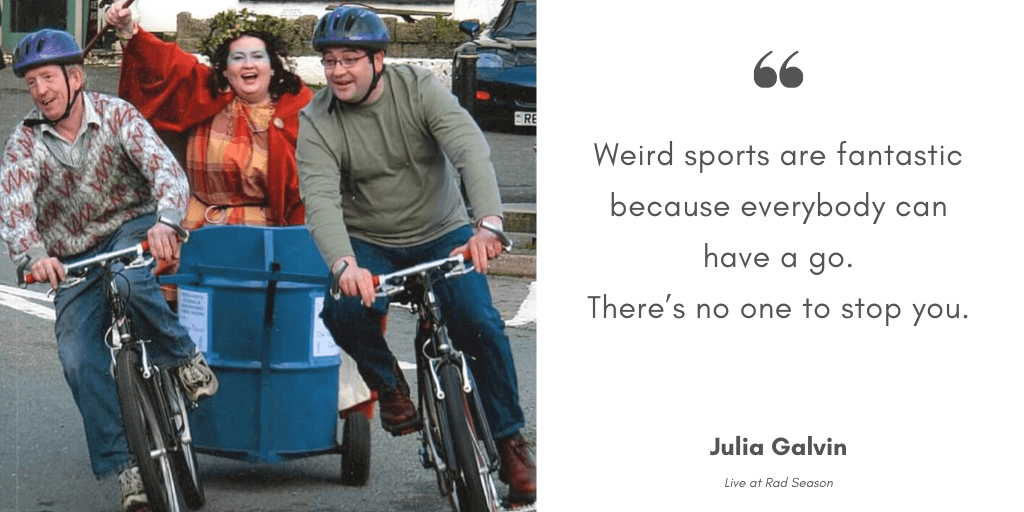
Wife Carrying Championships
So in 2002, a newspaper article had written about me bog snorkelling, and it said other strange sports around the world include wife carrying in Sonkajärvi, Finland.
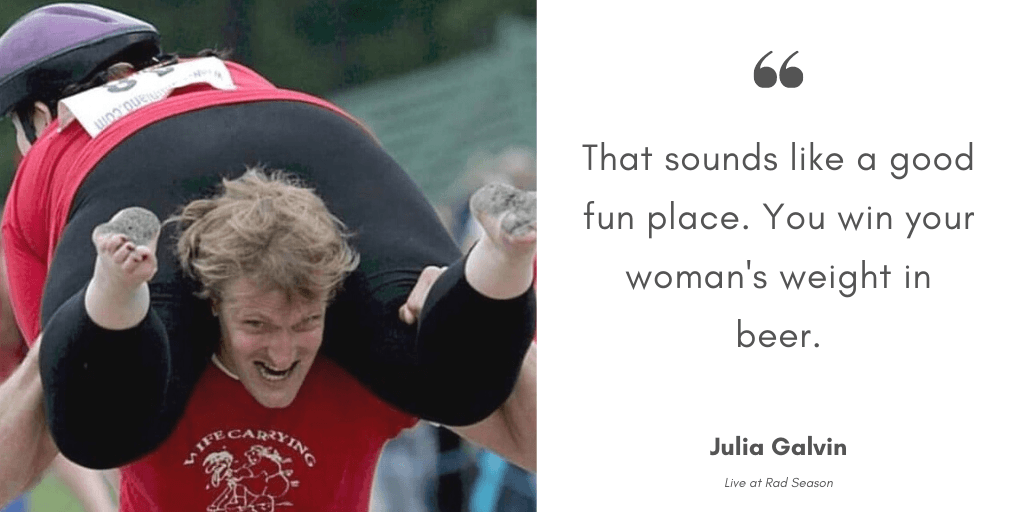
Now, I am probably three times the size of any normal woman and four times the size of a wife carrying woman. So I thought this might be worth winning, even though I don’t drink. I thought it might be an incentive for somebody. I thought it would be a bit of a laugh seeing the big woman doing the wife carrying race. Only the trouble was trying to find a man to carry on me.
I was on the television, found one chap, but he was okay online. But when I met him, we didn’t click at all and going to a foreign country this isn’t going to work. So we parted ways very early. Then I had to find a sponsor. I got a sponsor from Paddy Power. They are a betting company here and internationally. They sponsored me and we found a man, a strong man, one of the official strong men of Ireland, Jason O’Reilly. He was starting a new job as a postman or something so he couldn’t take time off. At this point, I was 20 Stone. He was able to put me on his forearm and put me sitting up there, and he said, this would make a great picture. This would make a great photograph. But as eager as we both were to go, he couldn’t go because of holiday restrictions and things. So I ended up finding my friend Paul Roberts.
I met him at the airport with minutes to go before checking in. I hadn’t a clue about the chap. I had no notion about him at all. That’s 2003 and we’re the best of buddies since. I’ve been to his wedding and everything. I’ve had a great time. I have had a great friendship with Paul and his wife for years.
Oli: What are the actual rules of wife carrying?
Julia: You have to be 17 years of age and upwards, a minimum of 49 kilos. There are 2 dry obstacles of 80 centimeters. There’s a meter deep water obstacle, it’s maybe built by seven meters long.
Wife Carrying Champions
It’s cold even though it’s summertime in Finland and sunny all day round, 24 hours sunshine. The water obstacle is very very cold and it’s the first thing that you go into. I’ve come across lots of world champions like Taisto Miettinen and Kristiina Haapanen, they have won it a few times. They are from Finland. And there was Madis Uusorg and Margo Uusorg and John Lund from America. He took out last year’s as well. And the current one, hopefully, I’ll get this right, is Vytautas Kirkliauskas and his wife Neringa. They’ve won it for the last two years, they’re from Lithuania. They are a fantastic couple.
These people are very, very slight and very, very fit. The women are trying to make it up to 49 kilos, which is just about 100 pounds or seven stone before the race. They have all their tricks of the trade as well. They drink a lot of water and just make it up to the 49 kilos at weigh-in.
I never had to drink the water. I’ve never won the beer either but that’s another story.
Oli: What’s the town like where it takes place?
Julia: The town is lovely and they take very good care of all there are foreign dignitaries. They will assign you somebody that speaks English and Finnish. So you don’t have to worry. The majority of people that were there were at the age of 15 to 70. They all speak a good level of English. You won’t die and there’s a lot of English signs. It’s good in the first year to get an English guide.
There are different ways you can get carried. When I went with Paul the first year, he used piggyback. I didn’t know any other way to do it. But when we got there we saw the Estonians carry their women upside down. It’s very interesting.
‘The women are carried more or less like backpacks upside down.’
So in 2007, Margo Uusorg came out of retirement to carry me that way. So I think you may have a picture of me. Because I’m so big in the front I could really grab him around the waist as such. But if you look at the smaller contestants, they have a very interesting way of holding on to their own ankles, which is a modified Estonian position where the men can actually use two arms more freely. I think, at the minute the last race was 66 seconds for 253 meters.
Oli: Are you wearing helmets?
Julia: Yeah. If you don’t make the grade of 49 kilos you can have to wear a led weight belt.
I’ve seen an Irish woman there when she didn’t make weight, she taped the weights onto her legs rather than carrying it as a backpack. So then there was less movement. Tricks of the trade.
I have this feeling I’ll be there next year.
Weird Sports Around the world
Oli: Now do you see a mini explosion with these different events in other parts of the world. Wasn’t there a bog snorkelling event in Australia and wife carrying over in China?
Julia: I bog snorkeled in Ireland, Northern Ireland, Wales and some boggy Finnish lakes but I’ve also bog snorkelled in Australia’s Julia Creek. They run a great event up there called the Dirt n Dust Festival. Now if you’re into triathlons, they have the most amazing triathlon.
You swim in this river with freshwater crocodiles and you cycle 25 kilometers and then you get off your bike kilometers down in serious speed up to about 40 degrees heat. They run a fantastic event over there. Brad Beven is the world champion of triathlon. I met him there as well. It’s amazing. The amount of World Champions I know, it’s not right. People like me are meant to be hanging around with World Champions. You know these people have worked very very hard to be where they are.
Oli: Do you think that’s one of the appeals with these types of events? It’s the people that take part and it’s the community? Is that what you like about it?
Julia: I’m a teacher and what I see in schools these days is people just give out medals willy nilly, just because children have participated. You know, back when I was running my race, I came last. But I always respected people who came first. They were the farmers’ daughters that ran after cows on a daily basis.

It took me 34 years to become a world champion. There’s an option for everybody, you just have to find the right sport.
Oli: That’s great. Is there anywhere that’s been on your bucket list like an event or place?
Julia: I’ve been threatening this one in Austria, somewhere in the Alps. Anyway, there’s one called ‘Arse Sledding’. You slide down a mountain in lederhosen in the snow.

You know I’m not great with heights and I’m not great with snow. I think I’ll give it a shot at some point or another. I wouldn’t mind doing the bog snorkelling triathlon or some part of it.
Maybe in my wildest dreams the Julia Creek Dirt n Dust festival triathlon as well. There are two options for me. You never know when something’s going to come up like even when was over in Julia Creek. There were these things like cow pat throwing. I wasn’t expecting that, fly-swatting.
Here on the first weekend of May they have this thing called the ‘International Stone Throwing Competition.’ It’s a small, tiny village, maybe two or 300 people, maybe two or three pubs, a supermarket and a restaurant, a hostel and nothing much going on. Except that it’s a little stop off for tourism on the way to North Claire. In order to pay for their Christmas lights.
In May they sell idiots like me three stones for five euros in order to throw them at an upturned bottle.
It’s called the Festival of Finn. You throw them at the bottle, and you’re maybe about four meters away. You throw it and if you crack the bottle you get into the next round. You keep going until you’re into the final and you can crack this wine bottle that’s turned on its head. I’ve entered that one.
I’ve entered the Christmas tree throwing. That goes on in County Clare as well, which is my neighboring county across the river Shannon. I’ve probably done things that I’ve forgotten about, you know that I’m still kind of stuck on the bog snorkelling and wife carrying and stuff you know that’s the main pastime.
Oli: Is there anything that stands out? Any crazy stories or something unusual? The events are pretty unusual in themselves.
Julia: I don’t know. Finnish people don’t talk about emotions, they talk about feeling.
There’s a great feeling of emotions in Finland when it’s bright all night. After the race, everybody’s more relaxed. They’ll have a few beers and then sit around the campfire. They swim at midnight because it could be any time of day. So it’s all good fun over there.
With bog snorkelling, the day that I won the World Championship still means a lot.
Oli: Any advice that you would give people that are looking to either to try one of these sports for the first time?

Oli: I know when I did bog snorkelling for the first time I thought it was amazing. I wanted to come back this year, but hopefully, next year when it’s on again.
Julia: Lovely. What time did you do?
Oli: I can’t remember now. Looking back at it, I competed under Australia. So as an international I think I was the second or third international. I was happy with that. It was good fun.
Julia: Here’s another thing. I’ve been an Elf in Lapland for Santa Claus. That was another pastime. I did that for a couple of weeks, maybe seven years ago. I spent two or three weeks there.
I went to Australia to commentate on a wife carrying race in Geraldton in Western Australia. I have a soft spot over there. There was a guy called Prince Leonard. He had his own country called the Hut River Principality. It’s closed up now for repair. I represented them at international sports. Prince Leonard passed away last year but he made me a Dame for representing the Hut River Principality for international sports. That’s another highlight of my life.
The Chinese race was good last year as well. Chinese men are very small. So they didn’t really get to carry me. I had one guy carry me about 50 meters or something, but I took part anyway. I had good fun representing Ireland and Europe.
Oli: Were there many many countries represented?
Julia: John Lund came from America. There was Estonia, Finland, England and me from Ireland.
It was very warm and dry and the mountains were quite high as well.
Oli: Is the course something similar to what they do in Finland?
Julia: I think they try their best to copy it. I’d be worried for the Finns, that the Chinese would try to take it over. They don’t keep an eye on their public relations. The people in Sonkajärvi are very savvy. They know exactly what they’re doing. They have their own branding out there. Their international relationships are very good.
Oli: If people are trying to get hold of you, what’s the best way of getting in contact?
Julia: Don’t know, I suppose my email, which is bogchick@gmail.com. I’m on Twitter, Instagram, Facebook. I’m on all those things. I didn’t bother with Snapchat, I’m too old for Snapchat.
Oli: Julia it’s been great speaking to you. Look forward to seeing you next year at Bog Snorkelling.
Julia: Excellent. See you there.
Watch the video:
Photo Credit: Julia Galvin
Missed the last episodes? Check them out!
Episode 6: Trail Running – Edward Chapman
Episode 7: Lifestyle Design – Carl Paoli
Episode 8: World Surf League – Joe Turpel
Last updated on Jul 1, 2020Have you subscribed to our Newsletter or Podcast? Listen to us on Apple Podcast and Spotify and follow us on Facebook, Instagram Twitter and YouTube.
Accommodation near Listowel, Ireland
Rad Season is providing you with rentals and hotels at the lowest prices available online. Book your stay near Listowel, Ireland using the map below!
